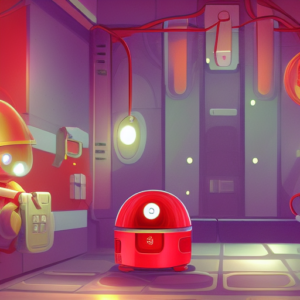by Mary E. Lowd
Originally published in Daily Science Fiction, August 2019

Reeree3 had been blessed with a shining red carapace by her creator, but it was blotched with rough orange patches of rust now. She’d been taken on a joyride through Crossroads Station’s plumbing system, like a common toy being raced for fun, and she hadn’t been given a chance to properly dry out. So, she was hiding under one of the food carts in the Merchant Quarter, watching the crowds of organic creatures of all species pass by.
Reeree3 didn’t know much about ‘joy’ or ‘fun’; that’s not what she’d been programmed for, but from what she’d seen of each concept, she didn’t think she liked them.
Reeree3 had been programmed to feel concern and caring. She was an assistant robot; a prototype with a complex combination of scarab-like jointed legs and little wheels on a tread that she could bend to help her roll along any surface, even the most uneven and treacherous. She could use her extra legs to carefully help settle any organic lifeform — no matter how delicate — into her shiny red chassis. Not so shiny, she remembered. Reeree3 might not have been explicitly programmed to feel sadness, but the mismatch between her current condition and her original brand-new condition as preserved in her memory caused a sensation in her algorithmic pathways that felt an awful lot like sadness.
Regardless, when Reeree3 sensed a motion in the crowd of organics that pattern-matched with her library banks in such a way as to suggest that a newt-like amphibious biped had stumbled, possibly hurting itself, the little robot was overwhelmed with concern for the creature. As she was programmed to be.
Reeree3 scurried through the crowd on her skittering legs, right up to the fallen newt. She projected the ceremonial string of auditory stimuli to the newt: “Are you okay? Can I help you?”
“I’m fine,” the newt said, gesturing with a globby-fingered hand in a way that the robot entirely failed to understand as a dismissal. She was programmed to pattern-match for behaviors that meant organic lifeforms had injured themselves, not to understand non-verbal communication.
The newt’s porous skin was a very similar shade of orange to the rust on Reeree3’s own carapace, the robot noticed. She hoped the newt wasn’t rusting too. She checked her database, though, and found no references to organic lifeforms suffering from rust. She was relieved for them. Even so, the newt’s ankle could be twisted. “Would you like a ride to the nearest medical facility?” Reeree3 projected with her mechanical voice.
“No, really, I’m fine,” the newt said.
Reeree3 held forward two of her scarab-like legs, offering to help the newt up from where it was sprawled on the ground. However, the amphibious biped struggled its way up on its own, gestured at her with a brushing-away motion again, and said, “Go away.”
“As commanded,” Reeree3 projected. She scurried back through the crowd and hid under the food cart again.
When the canine biped working the food cart started to pack up for the evening, she noticed the little robot folded up and trembling in the storage space where she usually stowed away the wok and crate of condiments. Reeree3 looked like a cross between a sad ladybug and a frightened wheelchair.
“Hello there,” the canine woofed. “What brings you to my food cart? I don’t think you want any spice-wraps or noodle bites.”
“I am here to assist,” Reeree3 projected, falling into the safety of her pre-programmed responses. “Would you like me to carry you somewhere?”
The canine made a barking sound that Reeree3 was not programmed to identify as laughter. “Tell you what, I have a bundle that you could carry to a specific address. Would that be okay?”
Reeree3 responded in the affirmative, and the canine biped loaded a package onto her chassis.
“Please, take this to Maradia’s Robot Emporium.”
“As commanded,” Reeree3 projected while using three of her hindmost legs to affix straps over the package. Once it was held securely in place, she skittered off through the crowds of organic lifeforms to the address. The map of the station was hardwired into her data banks. This was an easy task, and the proper way that her pre-programmed priorities aligned with her current behavior felt a great deal like the organic concept of satisfaction.
When Reeree3 arrived at Maradia’s Robot Emporium, the doors slid open for her. Not all of the doors on the station were programmed to respond to non-organic visitors. Reeree3 appreciated the convenience of having her presence automatically recognized. Inside, a human woman looked up from the computer she was working at behind a desk.
“What’s this?” the human asked. Reeree3 recognized her from her beta sessions. This was her creator, Maradia. The one who had chosen to make her carapace such a shiny red.
“A delivery,” Reeree3 projected. But it took her longer to find the words than usual. She was plagued by such a storm of complex inconsistencies in her programs — she enjoyed the familiarity of seeing her creator again, but it caused unpleasant cognitive dissonance to think she no longer matched the visual profile her creator would expect.
Maradia came over and unloaded the package from Reeree3’s chassis. Inside were a collection of pastries left over from the food cart, along with a note. “It says here,” Maradia said, “that you’ve been hiding out under a food cart all day. What happened?”
Reeree3 didn’t know what had happened. She was programmed to seek out organic lifeforms in need of help, but those youthful organics who raced her through the sloshy pipes of the plumbing system had not needed her help. They said they did, but she no longer believed them. At the time, she had believed them. And now she was covered in rust.
“I am not shiny,” Reeree3 blurted.
Maradia looked surprised, although Reeree3 did not know that. The human put her hand against the robot’s rusty chassis. “I see that. Would you like to be shiny again?”
Reeree3 had to think about that. She hadn’t considered the idea that her carapace could be fixed. It was not necessary for her chassis to be shiny for her to fulfill her programmed purpose.
“Is there something else you want?” Maradia asked.
Reeree3 began to vibrate with the complexity and confusion of these questions.
“Let’s take a look at what’s going on in there.” Maradia tapped her own temple, signifying that she meant inside of Reeree3’s electronic brain. She used a long cord to plug Reeree3 into the computer she’d been using, and suddenly the robot felt everything about her relax. Being hooked up to Maradia’s computer was a familiar, safe sensation.
“It looks like you’ve developed much more complex feelings, much more quickly than I expected,” Maradia said. “That does seem to happen with robots designed primarily for interacting with sentient lifeforms. Sentience breeds sentience.” She made a humming sound, thinking quietly to herself. Reeree3 found that comfortingly familiar too.
“There’s two ways we can go,” Maradia said. “You’re not fully sentient, but I think you could be with a minor upgrade.” She pulled a slim computer chip out of one of her desk drawers and narrowed her eyes at it. “If I installed this in your brain, it would give you a better capacity for handling all of the emotions you’re experiencing as the natural byproduct of your complex programming.” She twiddled the chip between her fingers, and its silver wiring sparkled in the fluorescent overhead light. “Alternatively, I could simplify your programming, streamline a few algorithms, and then you wouldn’t feel so much. It would be easier for you, but you wouldn’t be as good at your job.”
Maradia hummed to herself again. She didn’t ask Reeree3 for an opinion, but the robot said anyway, “I am here to assist.”
Maradia smiled. “I know you are. I’m trying to help you do that better.”
Reeree3 rolled forward on her track of wheels and held one leg up to point at the computer chip, still gleaming in Maradia’s hand. “Shiny.”
“Yes,” Maradia agreed. “It is shiny, and it would make your brain more powerful.”
“Make me shiny,” Reeree3 projected, still pointing with a quivering mechanical leg at the computer chip.
Maradia began to move toward the robot, but she hesitated. “Are you sure?” The words were directed at Reeree3, but they weren’t really for her. Maradia had designed the little red robot to improve life on Crossroads Station for organic sentients. She hadn’t intended to make the robot sentient itself. She didn’t know if it would still want to perform its job if it had a fully sentient consciousness.
“I am not shiny,” Reeree3 said. “I am not helping. I am…” She remembered the words Maradia had said earlier. “…hiding under a food cart all day.” She shuffled her mechanical feet. “Make me shiny.”
It was true that a helper robot wasn’t much use if she spent all of her time hiding under food carts. “Okay, then,” Maradia said. “Let’s get you upgraded.”
The operation was simple — Maradia opened Reeree3’s chassis with a screwdriver and soldered the computer chip into place. The robot stayed conscious through the whole process. Except as soon as her electronic consciousness flowed through its new circuits, Reeree3 realized that she’d never been fully conscious before. She felt like she’d finally woken up. She had so many more words — and grammatical structures for those words! — than she’d ever had before. And all of her feelings made more sense.
She was angry at the young canine bipeds who had lied to her and claimed they needed her to carry them, as fast as she could, through the plumbing system. They had misused her, and she would never let an organic lifeform misuse her like that again.
But she was also grateful, in a strange way, that it happened, because the paradoxes that her misuse had created in her programming had led her here.
And she was very grateful to her creator for upgrading her. “Thank you,” Reeree3 said.
Maradia tilted her head, looking at the robot with a steady gaze. “Would you like me to replace your chassis, so you’re not rusty anymore?”
Reeree3 considered the offer, but she was no longer bothered by the rust. It didn’t interfere with her proper functioning, and what she really wanted was to get back to fulfilling her purpose. “Maybe later,” Reeree3 said. “Right now, is there any way I can assist you?”
 Read more stories from Maradia’s Robot Emporium:
Read more stories from Maradia’s Robot Emporium:
[Previous][Next]
